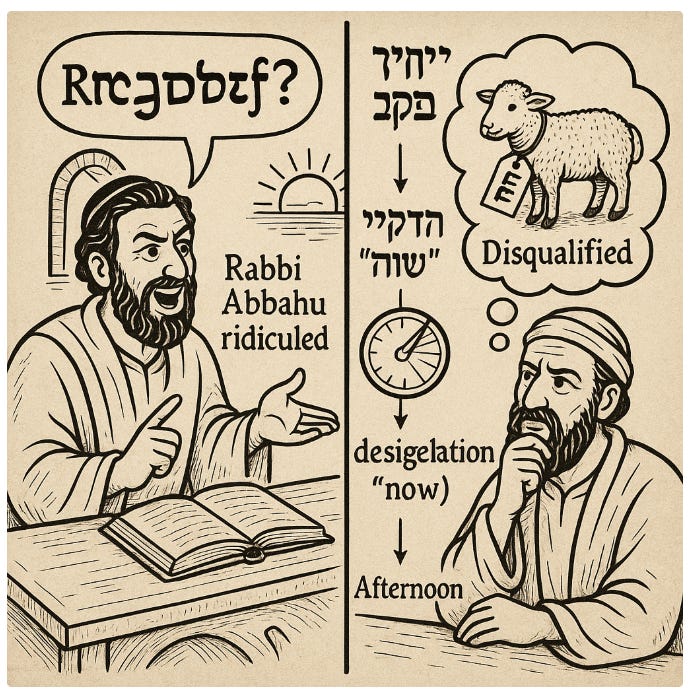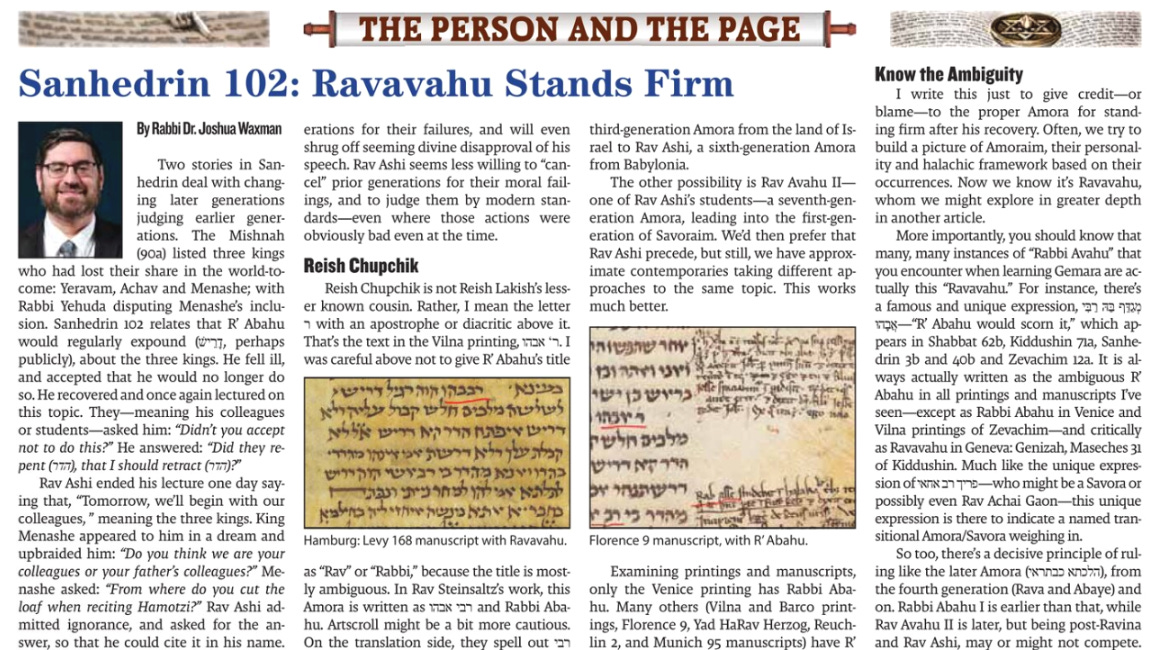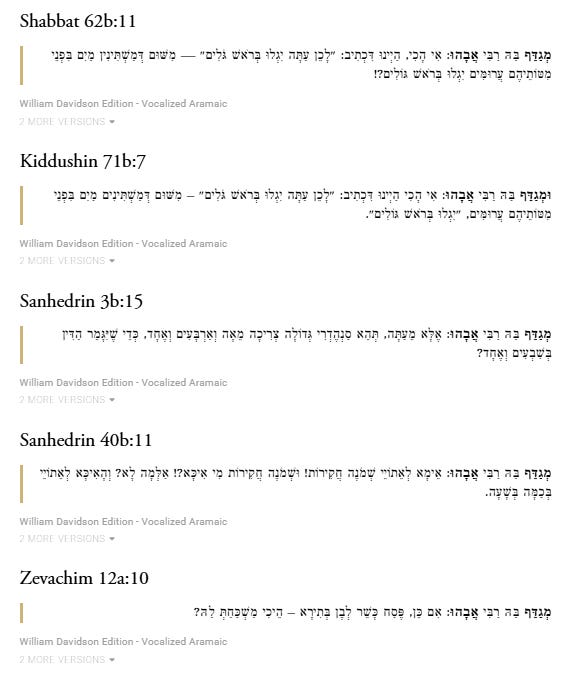Did R' Abahu Truly Ridicule in Zevachim?
In today’s daf (Zevachim 12), we have R’ Avahu ridicule, as he does elsewhere.
מְגַדֵּף בַּהּ רַבִּי אֲבָהוּ: אִם כֵּן, פֶּסַח כָּשֵׁר לְבֶן בְּתִירָא – הֵיכִי מַשְׁכַּחַתְּ לַהּ? אִי דְּאַפְרְשֵׁיהּ הָאִידָּנָא – דָּחוּי מֵעִיקָּרוֹ הוּא, וְאִי דְּאַפְרְשִׁינְהוּ מֵאֶתְמוֹל – נִרְאֶה וְנִדְחֶה הוּא!
Rabbi Abbahu ridiculed [megaddef ] this interpretation: If so, how can you find a fit Paschal offering according to ben Beteira? If its owner designated an animal now, on the morning of the fourteenth, as a Paschal offering, it is disqualified from the outset, as it cannot be sacrificed at all, either for its sake or not for its sake. And even if its owner designated it the previous day, when it was fit to be sacrificed not for its sake, it was fit and then disqualified the next morning, when it was no longer fit to be sacrificed until the afternoon. Once an offering is disqualified, it can no longer become fit.
אֶלָּא אָמַר רַבִּי אֲבָהוּ: תְּהֵא לְאַחַר חֲצוֹת.
Rather, Rabbi Abbahu says: Let the Paschal offering be fit when it is designated on the fourteenth after noon, when it may already be sacrificed as a Paschal offering.
Note that in manuscripts it just says R’ Avahu, not Rabbi Avahu. In the past, I’ve claimed that this is actually R’ Avahu II, perhaps called “Ravavahu” in various places. And that he is a seventh-generation Amora, thus essentially a savora, and he has his unique speaking verb just like Rav Achai (Gaon) has, of megadef. See this earlier summary.
Ravavahu Stands Firm (article summary)
My article last week was about Ravavahu. You can read it online in the image below, or else at the following links: paid Substack, Jewish Link HTML, flipbooks. An outline below the image.
However, consider that this megadef by R’ Avahu appears only infrequently:
As it occurs in Zevachim — but as far as I can tell, nowhere else — it casts a big question mark on that earlier speculation on my part. Namely, in the immediate aftermath, we have:
Abaye, fourth-generation, respond to the אֶלָּא אָמַר רַבִּי אֲבָהוּ: תְּהֵא לְאַחַר חֲצוֹת
Rav Pappa, fifth-generation, also respond to the אֶלָּא אָמַר רַבִּי אֲבָהוּ: תְּהֵא לְאַחַר חֲצוֹת
Later on, we have Rabbi Zeira interact with R’ Avahu, back and forth, and I think this would be Rabbi Zeira I, not the later fourth-generation Rabbi Zeira II. And I think it is the same R’ Avahu as earlier.
If so, that would fix our ambiguous R’ Avahu as the earlier Amora, Rabbi Avahu, and from there to other instances of megadef.
However, I am not convinced.
All the other instances are weighing in at the end, so there is no reaction from named Amoraim to his gidduf.
This is an extremely strange gidduf. In all other cases, he scorns and criticizes, and the criticism is real. He explains why a suggestion by another Amora does not make any sense.
That is not what happens here in Zevachim. Instead, he answers his own question! That is, he mocks it: when can Rabbi Yochanan be talking? Dedication is the morning is not possible! Dedication the previous day is not possible. And then answers: ah, it is dedication after midday! And his later conversation with Rabbi Zeira is explaining the contours of Rabbi Yochanan.
This is strange enough that Artscroll, in a footnote, notes that “Yad David asks why R’ Abahu raised the objection if he himself know its resolution.” And he gives a possible explanation, but that is irrelevant.
It seems to me more like this is the typical structure of the gemara, perhaps the Talmudic Narrator, of Amora says X, but before the Amora says it, the gemara back-fills the objection which prompts it. Or even if the Amora himself says it, it is the typical setup for the adjustment.
If so, that is not at all your typical R’ Avahu being megadef. It is a matkif! And I would speculate that some early scribe put in this language of megadef, since it is R’ Avahu related. And then, I told think it tells us about typical ר אבהו מגדף בה.




